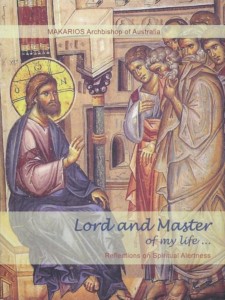Lord and Master of my Life
By Archbishop Makarios of Australia

“O Lord and Master of my life, take from me the spirit of sloth, despair, lust of power, and idle talk. But give rather the spirit of chastity, humility, patience, and love to Thy servant. Yea, O Lord and King, grant me to see my own transgressions, and not to judge my brother, for blessed art Thou, unto ages of ages. Amen .”
This prayer of Saint Ephraim which is repeated frequently in the period of Lent, is the framework upon which the author builds the structure of this beautiful and spiritually uplifting small book.
After briefly touching on the biography of Saint Ephraim, Archbishop Makarios begins to unpack each of the petitions made in this short prayer. Starting with each of the passions of sloth, despair, lust of power and idle talk, he uses his own spiritual experiences, those of the Church and desert fathers and many modern life examples to show the reader how these passions are evidence of being distant from our Lord, and absent from both His will and His Kingdom.
The chapters that follow elaborate on the virtues requested in the prayer being, chastity, humility, patience and love. With each virtue, he pries open the doors of our heart with warmth and light, with simple, loving counsel, showing the path to salvation is full of joy, and peace. The reader is strengthened and inspired.
Some of the key messages in this enlightened work are that it is key to have the desire to rid oneself of the passions as well as the desire to attain virtues. Also that every good thing for the soul has as its foundation the emptying of oneself for the love of others and thus for the love of God.
The language is simple and easy to understand. The concepts the author is helping us to embrace are part of everyday life and living, both with other people and with ourselves. He touches the reader, because he explores elements of our heart and of our behaviour that we keep deeply to ourselves. However, he does this is in a manner that encourages and strengthens.
The book and the prayer itself is presented as a small microcosm of the Lenten experience, which itself is a miniature version of the life of a person. That is, by working on our passions, taking on virtues, seeing our sins and not judging others, we build a new person and arrive at the Resurrection, blessing our Lord and Master for all ages.
We can use this wonderful book to inspire and enlighten our journey during Lent, but also as a regular reference point for the most basic elements of building our life in Christ.
† Fr N. S.
Source: Lychnos June-July 2020 edition
